最新新概念英语第二册逐句精讲Lesson1~3
新概念二册Lesson1-3
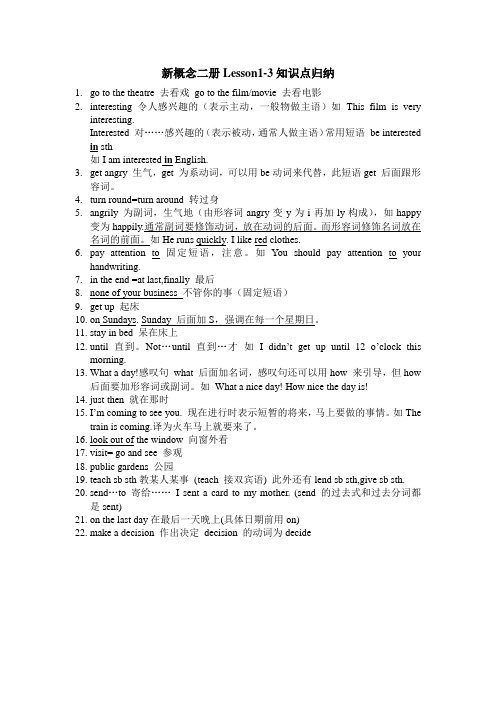
新概念二册Lesson1-3知识点归纳1.go to the theatre 去看戏go to the film/movie 去看电影2.interesting 令人感兴趣的(表示主动,一般物做主语)如This film is veryinteresting.Interested 对……感兴趣的(表示被动,通常人做主语)常用短语be interested in sth如I am interested in English.3.get angry 生气,get 为系动词,可以用be动词来代替,此短语get 后面跟形容词。
4.turn round=turn around 转过身5.angrily 为副词,生气地(由形容词angry变y为i再加ly构成),如happy变为happily.通常副词要修饰动词,放在动词的后面。
而形容词修饰名词放在名词的前面。
如He runs quickly. I like red clothes.6.pay attention to 固定短语,注意。
如Y ou should pay attention to yourhandwriting.7.in the end =at last,finally 最后8.none of your business 不管你的事(固定短语)9.get up 起床10.on Sundays. Sunday 后面加S,强调在每一个星期日。
11.stay in bed 呆在床上12.until 直到。
Not…until 直到…才如I didn’t get up until 12 o’clock thismorning.13.What a day!感叹句what 后面加名词,感叹句还可以用how 来引导,但how后面要加形容词或副词。
如What a nice day! How nice the day is!14.just then 就在那时15.I’m coming to see you. 现在进行时表示短暂的将来,马上要做的事情。
新概念英语第二册Lesson 1 --30讲义

新概念英语第二册1-30讲义Lesson 1 A private conversation★private adj.私人的 public adj. 公众的,公开的① adj. 私人的private life 私生活 private school 私立学校It's my private letter. (如果妈妈想看你的信)It's my private house. (如果陌生人想进你的房子)②adj. 普通的private soldier 大兵《Private Ryan》(《拯救大兵瑞恩》)privacy n.隐私It’s privacy. 这是我的隐私!(不愿让别人知道的)★conversation n.谈话have a + talk/chat/dialogue/conversation/gossip 名词变动词talk 内容可正式可不正式, 也可以私人Let’s have a talk.dialogue 对话, 可以指正式国家与国家会谈China and Korea are having a dialogue.chat 闲聊,就是北京人说的“侃”,说的是无关紧要的事。
gossip 嚼舌头, 说长道短★theatre n.剧场, 戏剧cinema n.电影院★seat n.座位have a good seat/place,这里的seat指place(指地点),而不是chair.take a seat/take your seat Beijing to Wuhan? Beijing to Wuhan?, 就坐Is the seat taken? 这个位置有人吗?请坐的3种说法 :Sit down, please. (命令性)Take your seat, please.Be seated, please. (更礼貌)★angry adj. 生气的angrily adv. 生气的angry =crossI was angry. /He was cross.annoyed: 恼火的;be blue in the face 脸上突然变色程 I was annoyed.度 I was angry/cross.加 I was very angry.深 I am blue in the face. (脸色都青了, 相当生气了)★attention n. 注意Attention ,please. 请注意(口语)pay attention to …对……注意You must pay attention to that girl.pay a little attention to 稍加注意pay much attention to 多加注意pay more attention to 更多注意pay no attention to 不用注意pay close attention to特别注意★bear(bore, born) v. 容忍1 vt. 承受,支撑,承担,负担Can the ice bear my weight?Who will bear the cost? 谁来承担这笔费用?2 vt. 忍受(一般与can/could连用于疑问句及否定句中)She eats too fast. I can’t bear to watch/watching her. 她吃得太快。
新概念英语第二册:1-3课课文详解及语法解析
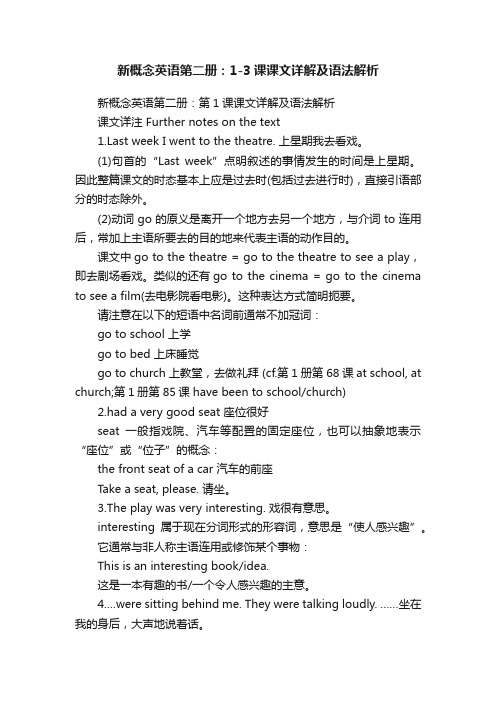
新概念英语第二册:1-3课课文详解及语法解析新概念英语第二册:第1课课文详解及语法解析课文详注 Further notes on the textst week I went to the theatre. 上星期我去看戏。
(1)句首的“Last week”点明叙述的事情发生的时间是上星期。
因此整篇课文的时态基本上应是过去时(包括过去进行时),直接引语部分的时态除外。
(2)动词go的原义是离开一个地方去另一个地方,与介词to连用后,常加上主语所要去的目的地来代表主语的动作目的。
课文中go to the theatre = go to the theatre to see a play,即去剧场看戏。
类似的还有go to the cinema = go to the cinema to see a film(去电影院看电影)。
这种表达方式简明扼要。
请注意在以下的短语中名词前通常不加冠词:go to school 上学go to bed 上床睡觉go to church 上教堂,去做礼拜 (cf.第1册第68课at school, at church;第1册第85课have been to school/church)2.had a very good seat 座位很好seat一般指戏院、汽车等配置的固定座位,也可以抽象地表示“座位”或“位子”的概念:the front seat of a car 汽车的前座Take a seat, please. 请坐。
3.The play was very interesting. 戏很有意思。
interesting属于现在分词形式的形容词,意思是“使人感兴趣”。
它通常与非人称主语连用或修饰某个事物:This is an interesting book/idea.这是一本有趣的书/一个令人感兴趣的主意。
4.…were sitting behind me. They were talking loudly. ……坐在我的身后,大声地说着话。
新概念英语第二册第一课语法讲解

新概念英语第二册第一课语法讲解Here is an essay on the grammar explanation in New Concept English Book 2 Lesson 1, written in English with more than 1000 words as requested.The grammar explanation in New Concept English Book 2 Lesson 1 is a crucial foundation for learners of the English language. This lesson delves into the intricacies of verb tenses and their usage, equipping students with the necessary tools to effectively communicate in various contexts. By understanding the nuances of different verb tenses, learners can express their thoughts, ideas, and experiences with greater precision and clarity.One of the primary focuses of this lesson is the present tense. The present tense is the most fundamental and widely used verb tense in the English language. It is employed to describe actions, states, or occurrences that are happening in the present moment. For example, "I walk to the park every day" or "She lives in New York." The present tense is also used to express general truths or facts that are not bound by time, such as "The sun rises in the east" or "Water boils at 100 degrees Celsius."Another important aspect covered in this lesson is the past tense. The past tense is used to describe actions or events that have already occurred. It is essential for recounting personal experiences, historical events, or narratives. For instance, "I went to the beach last weekend" or "The dinosaurs lived millions of years ago." The past tense can take various forms, including the simple past (e.g., "I walked"), the past continuous (e.g., "I was walking"), and the past perfect (e.g., "I had walked").The future tense is also explored in this lesson. The future tense is used to express actions or events that will take place in the future. It is crucial for making plans, predictions, or expressing intentions. Examples include "I will go to the movies tonight" or "She will graduate from college next year." The future tense can be formed using modal verbs like "will" or "shall," as well as the present continuous tense with "going to" (e.g., "I am going to study for the exam").In addition to the basic verb tenses, this lesson also covers the concept of perfect tenses. Perfect tenses are used to describe actions or events that have been completed or have occurred before a specific time. The present perfect tense (e.g., "I have finished my homework") is employed to express actions that have been completed in the present, while the past perfect tense (e.g., "I had finished my homework before you arrived") is used to describeactions that were completed before a specific past event.Furthermore, the lesson delves into the use of the continuous tenses, which are used to describe ongoing or continuous actions. The present continuous tense (e.g., "I am studying for the exam") is used to express actions happening in the present, while the past continuous tense (e.g., "I was studying for the exam when you called") is used to describe actions that were in progress at a specific time in the past.The grammar explanation in this lesson also covers the concept of modal verbs. Modal verbs, such as "can," "could," "may," "might," "must," "shall," "should," "will," and "would," are used to express various shades of meaning, including ability, possibility, permission, obligation, and willingness. Understanding the appropriate use of modal verbs is crucial for conveying nuanced messages and effectively communicating in various situations.Throughout the lesson, the explanations are accompanied by numerous examples, which help learners understand the practical application of the grammar rules. These examples cover a wide range of contexts, from everyday conversations to more formal settings, ensuring that students can confidently apply the learned concepts in their own communication.The grammar explanation in New Concept English Book 2 Lesson 1 lays a solid foundation for learners of the English language. By mastering the different verb tenses, perfect tenses, continuous tenses, and modal verbs, students can develop a deeper understanding of the language and enhance their ability to express themselves with precision and clarity. This knowledge is essential for effective communication, whether in academic, professional, or personal settings. As learners progress through the lesson and actively practice the concepts, they will gain the confidence and proficiency needed to navigate the complexities of the English language with ease.。
新概念第二册课后答案详解Lesson1~3

【导语】新概念英语作为家喻户晓的经典之作,它有着全新的教学理念,有趣的课⽂内容及其全⾯的技能训练,为⼴⼤的英语学习者提供帮助!如果你也想学好英语,⼜怎能错过新概念英语?下⾯为您提供了相关内容,希望对您有所帮助!新概念第⼆册课后答案详解Lesson1 1 关键句型练习 A I (1) got (2) very angry (3) . I (1) could not hear (2) the actors (3) . I (1) turned round (2) .I (1) looked at (2) the man and the woman (3) angrily (4) . They (1) did not pay (2) any attention (3) . In the end (6), I (1) could not bear (2) it (3). I (1) turned round (2) again (6) . zI (1) can't hear (2) a word (3)! I (1) said (2) angrily (4) . zIt (1) is (2) none of your business (3) , the young man (1) said (2) rudely (4) . zThis (1) is (2) a private conversation (3)! B 1 I enjoyed the film yesterday. 2 I listened to the news carefully. 3 The man played the piano well. 4 The children played games quietly in their room yesterday. 5 He opened the door quietly. 6 He left immediately. 7 He planted a tree in the corner of the garden. 8 He read the letter quickly in his office before lunch. 9 I borrowed a book from the library this morning. 10 The cook spoilt the soup. 11 We stay at home on Sundays. 12 There are a lot of people at the bus stop. 13 The little boy ate greedily an apple in the kitchen this morning. 14 She draws beautifully. 15 I like music very much. 16 They built a new school in our village last year. 17 The match ended at four o'clock. 18 She received a letter from her brother last week. 2、选择题 1. b 选b最为正确。
新概念英语第2册Lesson1~3重点语法句型

新概念英语第2册Lesson1~3重点语法句型新概念英语第2册Lesson1重点语法句型一、重要句型或语法1、简单句及其语序1)句子种类:侧重按句子结构分为简单句、并列句、复合句2)句子成分:主语、谓语、宾语、定语、状语、补语、表语3)简单句的基本成分和语序:参考教材第14页的表格和练习二、课文主要语言点Last week I went to the theatre. 可介绍英语句子尾重的原则及其运用。
注意theatre(剧院)与cinema(电影影)的区别。
I had a very good seat. have a good seat,座位很好。
可简单复习第一册里学过的have的用法。
The play was very interesting. 对比interesting 和interested,引出使役动词的用法:-ed结尾强调“某人感到...”,-ing结尾强调“令人...”。
I did not enjoy it. 侧重讲enjoy doing的用法,提醒后面会学习动名词的用法。
They were talking loudly. 可以结合第一册第73课,复习“形容词+ly”构成副词的构词法。
文中类似的用法还有angrily何rudely。
I got very angry. 此处可以跟学生分析此处的动词如果用was,与用got,有何差异。
get是变化系动词,更能表达出作者情绪的变化过程,而be只是一个状态系动词,无法体现过程。
I could not hear the actors. 提示actor的构词法,引出actress。
也可以做拓展,引出waiter和waitress等。
I turned round. turn round也可以用turn around。
They did not pay any attention. pay attention to,表示注意到,to为介词,如果厚街动词,要用动名词doing 的形式。
新概念英语第二册逐句精讲语言点第2课(3)
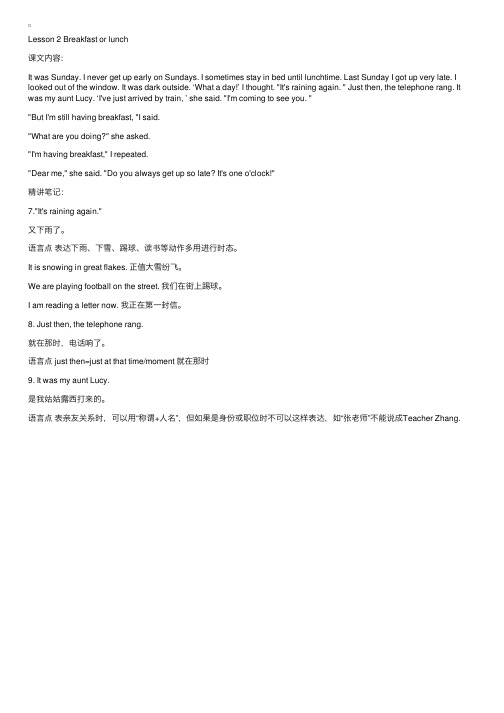
Lesson 2 Breakfast or lunch课⽂内容:It was Sunday. I never get up early on Sundays. I sometimes stay in bed until lunchtime. Last Sunday I got up very late. I looked out of the window. It was dark outside. ‘What a day!’ I thought. "It's raining again. " Just then, the telephone rang. It was my aunt Lucy. ‘I've just arrived by train, ’ she said. "I'm coming to see you. ""But I'm still having breakfast, "I said."What are you doing?" she asked."I'm having breakfast," I repeated."Dear me," she said. "Do you always get up so late? It's one o'clock!"精讲笔记:7."It's raining again."⼜下⾬了。
语⾔点表达下⾬、下雪、踢球、读书等动作多⽤进⾏时态。
It is snowing in great flakes. 正值⼤雪纷飞。
We are playing football on the street. 我们在街上踢球。
I am reading a letter now. 我正在第⼀封信。
新概念英语第二册lesson1-lesson3重要知识点复习

即学即用:
A (1)________ a clever boy he is !
A. What
B. How
C. What’s
(2)________delicious soup! B A. How B. What C. What a
A (3)________heavy snow!
一般的动词直接+ing
以e结尾的动词,去e,+ing
sit---sitting run---running swim---swimming put---putting lie---lying die---dying tie---tying
重读闭音节要双写结尾的 辅音字母加ing
以ie结尾的开音节词,改ie为 y再加ing
D. What an
( B )7.—That bag costs you 20 yuan. —________expensive it is! A. What C. What a B. How D. How a
( C )8.________beautiful music it is! A. What a B. What an
go there with you! A. What C. When B. How D. Why
考题回放
例1 ________big the tree is! A. What C. What a 答案 解析 结构。 B “How + 形容词/副词+主语+谓语” B. How D. How a
例2 ________good teachers they are! A. What C. How 答案 解析 A what修饰名词,单数可数名词前要加a / B. What a D. How a
新概念英语二册1-3课知识点整理
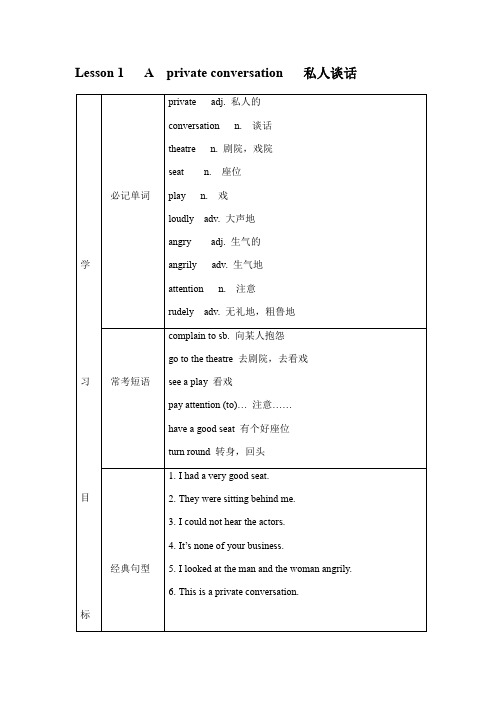
(2)seat座位vs. sit坐
take a seat/take one’s seat/be seated :座下来,就座
seat是及物动词,后面有宾语seat sb.让某人坐下
e.g. You seat him.
the day before yesterday前天
the month before last上上个月
(b)go to the theatre去看戏= see a play
拓展:
in the theatre在剧院里工作
at the theatre在剧院看戏
2.Ihad a very goodseat.我的座位很好。
例:Oh,it's you!啊,是你呀!
教材全解
st weekI went to the theatre.上星期我去看戏。
(a)本句为简单的一般过去时结构,类似的时间状语有:
last week上周last year去年
the week before last上上周
the night before last前天晚上
Lesson 1 A private conversation私人谈话
学
习
目
标
全
解
必记单词
private adj.私人的
conversation n.谈话
theatre n.剧院,戏院
seat n.座位
play n.戏
loudly adv.大声地
angry adj.生气的
angrily adv.生气地
〔两者之间〕任何一个
最新新概念英语第二册Lesson1~3单词

新概念英语第二册Lesson1单词prrvate adj.私人的,秘密,私立(营)的colrversation谈话,交谈【扩充词汇】chat聊天【单词搭配】a long conversation长时间的交谈 have a conversation 进行交谈【单词例句】A: Sorry,I must end the conversation.A:抱歉,我不能再说了。
B: OK.I respect your decision.B:好吧,我尊重你的决定。
theatrer ['θt?]剧场,戏院【单词搭配】in the theatre在戏院童工【单词例句】A: Can you accompany me to People's Theatre tonight?A:你晚上能陪我到人民剧院去看戏吗?B:CanI ask what's on?B:我能问问是什么戏吗?seat [si?t] 座位,席位play [ple?] 戏剧;v.玩,打(球),播放on loudly ['la?dl?] ad高声地t响亮地【扩充词汇】ringingly响亮地【单词例句】A:Don't speak loudly.A:不要大声喧哗。
B: Sorry, I'm a little worried.B:对不起,我有点儿着急了。
【扩】personal个人的,私人的【搭】private expenses自费,个人开支 private income个人所得【单词例句】A:I can't help you unless you state your business.A:如果你不把你的事说出来,我就不能帮你。
B:I prefer not to. It's a private matter.B:我宁愿不说,是一件私事。
angry ['gr?] adj,发怒的t愤怒的,生气的【单词扩充】indignant愤怒的【单词搭配】be angry with sb.生某人的气【单词例句】A: Please don't be angry about my foolish behavior.A:对于我冒昧的行为,请不要生气。
新概念英语第二册Lesson1~3课文注释
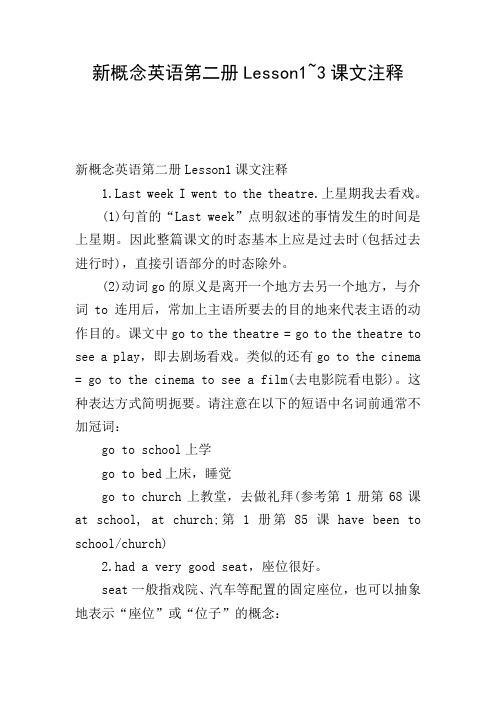
新概念英语第二册Lesson1~3课文注释新概念英语第二册Lesson1课文注释st week I went to the theatre.上星期我去看戏。
(1)句首的“Last week”点明叙述的事情发生的时间是上星期。
因此整篇课文的时态基本上应是过去时(包括过去进行时),直接引语部分的时态除外。
(2)动词go的原义是离开一个地方去另一个地方,与介词to连用后,常加上主语所要去的目的地来代表主语的动作目的。
课文中go to the theatre = go to the theatre to see a play,即去剧场看戏。
类似的还有go to the cinema = go to the cinema to see a film(去电影院看电影)。
这种表达方式简明扼要。
请注意在以下的短语中名词前通常不加冠词:go to school上学go to bed上床,睡觉go to church上教堂,去做礼拜(参考第1册第68课at school, at church;第1册第85课have been to school/church)2.had a very good seat,座位很好。
seat一般指戏院、汽车等配置的固定座位,也可以抽象地表示“座位”或“位子”的概念:the front seat of a car汽车的前座Take a seat, please.请坐。
3.The play was very interesting. 戏很有意思。
interesting属于现在分词形式的形容词,意思是“使人感兴趣”。
它通常与非人称主语连用或修饰某个事物:This is an interesting book/idea.这是一本有趣的书/一个令人感兴趣的主意。
4.…were sitting behind me. They were talking loudly. …坐在我的身后,大声地说着话。
新概念第二册课文精讲(含词汇讲解翻译)

新概念英语第二册课文及翻译私人谈话Lesson 1 A private conversationLast week I went to the theatre. I had a very good seat. The play was very interesting. I did not enjoy it. A young man and a young woman were sitting behind me. They were talking loudly. I got very angry. I could not hear the actors. I turned round. I lookedat the man and the woman angrily(状语). They did not pay any attention. In the end, I could not bear it. I turned round again. 'Inone of your business,' the can't hear a word!' I said angrily. ‘It’syoung man said rudely. 'This is a private conversation!'.上星期我去看戏。
我的座位很好,戏很有意思,但我却无法欣赏。
一青年男子与一青年女子坐在我的身后,大声地说着话。
我非常生气,因为我听不见演员在说什么。
我回过头去怒视着那一男一女,他们却毫不理会。
最后,我忍不住了,又一次回过头去,生气地说:“我一个字也听不见了!”“不关你的事,”那男的毫不客气地说,“这是私人间的谈话!”】生词和短语【NEW WORDS AND EXPRESSIONS★private adj.私人的it's my private letter/house ;美式英语private school:私立学校英式英语:公学ETON (private school)privacy:隐私it's a privacy. adj.《Private Ryan》private soldier:大兵private life:私生Letter n. 首字母public:公众的,公开的public school ;public letter 公开信;public place :公共场所★conversation n.谈话uni verse转动uniformUni--bi--tri--quar-pent-sex/hex-sept-oct-nov---decBilateral trade 双边贸易triangle quarter pentagon sex 古罗马历法10个月---12凯撒大帝julis---July 七月屋大维augusto--August 八月September九月(原七月)---septwolvesOctober 十月(原八月)---octopusNovemberDecember---- decadesubject of conversation:话题辨析:conversation, dialogue, talk, chat这些名词均含“交谈”之意。
新概念英语第二册1-3课讲义

Lesson 1I. Warming-up1. Do you go to the theatre? When did you go?2. Did you have a good seat?3. What was the play like?4. Did you enjoy the play?5. Did you have any unusual experience when going to the theatre?II. Comprehension questionsIII. Words and grammarprivate adj.私人的it's my private letter/house ;private school:私立学校public:公众的,公开的public school ;public letter 公开信;public place :公共场所privacy:隐私it's a privacy. adj. 《Private Ryan》private soldier:大兵private citizen 普通公民private life:私生活★conversation n.谈话subject of conversation:话题talk.可以正式,也可以私人的conversation. 比较正式一些Let’s have a talk They are having a conversation.conversation 用的时候比talk正式,意思上往往不非常正式.talk:可正式可不正式dialogue:对话China and Korea are having a dialogue. 正式chat: 闲聊gossip:嚼舌头have a + talk/chat/dialogue/conversation/gossip 名词变动词★seat n.座位have a good seat(place)take a seat : 座下来,就座take your seat/take a seat be seated, please 更为礼貌Is the seat taken? 这个座位有人吗?seat是及物动词,后面有宾语sit是不及物动词,后面不加宾语seat后面会加人; seat sb; seat him; seat:让某人就座you seat him;When all those present(到场者)_D_ he began his lecture.(重点题)A.sitB.setC.seatD.were seaed★angry adj. 生气的cross=angry ; I was angry. He was cross. annoyed: 恼火的;I was annoyed. I was angry/cross. I was very angry.be blue in the face; I am blue in the face.★attention n. 注意Attention ,please. 请注意pay attention :注意pay attention to : 对什么注意You must pay attention to that girl.pay a little attention :稍加注意pay much attention :多加注意pay more attention :更多注意pay no attention :不用注意★bear(bore,borne) v. 容忍bear, stand endure :忍受,容忍put up with :忍受I can't bear/stand youI got divorced.I could not put up with himbear/stand/endure忍受的极限在加大put up with=bear=standbear n.熊white bear bear hog :热情(热烈)的拥抱give sb a bear hug★business n. 事do business: 做生意go to some place on business:因公出差thing 可以指事情,也可以指东西It's my business 私人事情It’s none of your business.Simple past tenseA. 用法1)在确定的过去时间里所发生的动作或存在的状态。
新概念英语第二册逐句精讲

新概念英语第二册逐句精讲Alright, let's dive straight into the detailed explanations of New Concept English Book 2, focusing on making each paragraph unique and conversational in tone.First up, this sentence: "He always talks big, but his work never matches his words." Simple yet effective, it conveys the message that someone's bragging doesn't always match their performance. Like, you know that guy who always promises to do big things but never delivers? Yeah, that's the kind of person this sentence describes.Moving on, here's a more descriptive one: "The sunset cast a beautiful orange hue over the sky, painting the clouds with a warm glow." This one captures the beauty of nature, specifically the sunset, in a vivid way. It'salmost like you can see the sky turning orange and the clouds getting a soft, warm touch.Now, let's talk about emotions. This sentence hits home:"I can't believe he broke our promise like that. It feels like he doesn't care about our friendship at all." This expresses disappointment and hurt feelings over someone breaking a promise, highlighting the importance of trust and friendship.For a more philosophical note, we have: "Life is like a journey, full of unexpected turns and challenges. But it's up to us to navigate through it and make the most of it." This sentence encourages people to take control of their lives and see it as an adventure, rather than something to be feared.Lastly.。
新概念英语2精讲笔记
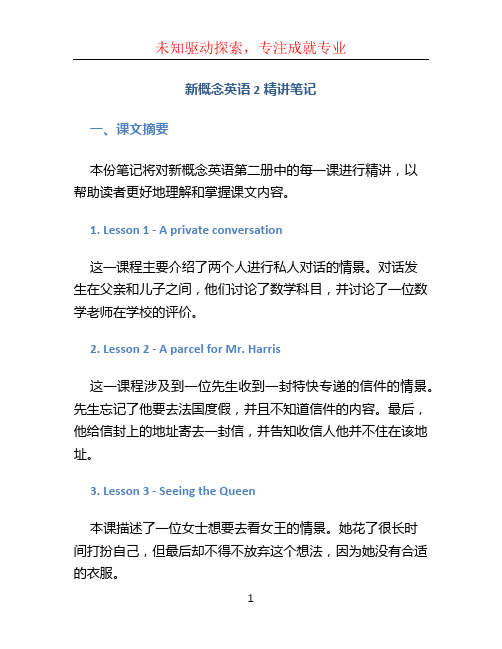
新概念英语2精讲笔记一、课文摘要本份笔记将对新概念英语第二册中的每一课进行精讲,以帮助读者更好地理解和掌握课文内容。
1. Lesson 1 - A private conversation这一课程主要介绍了两个人进行私人对话的情景。
对话发生在父亲和儿子之间,他们讨论了数学科目,并讨论了一位数学老师在学校的评价。
2. Lesson 2 - A parcel for Mr. Harris这一课程涉及到一位先生收到一封特快专递的信件的情景。
先生忘记了他要去法国度假,并且不知道信件的内容。
最后,他给信封上的地址寄去一封信,并告知收信人他并不住在该地址。
3. Lesson 3 - Seeing the Queen本课描述了一位女士想要去看女王的情景。
她花了很长时间打扮自己,但最后却不得不放弃这个想法,因为她没有合适的衣服。
4. Lesson 4 - A trip to Australia这一课程讲述了一个家庭计划去澳大利亚旅行的故事。
然而,悲剧发生了,火车撞上了他们的汽车,所以他们不得不取消他们的旅行。
5. Lesson 5 - The best and the worst本课程介绍了一个学生在考试中取得了最佳成绩的情景,然而,与此同时,他在体育课上却表现糟糕。
6. Lesson 6 - No parking这一课程讲述了一个人找不到停车场的情景。
他每次都被告知停车场已满,最后他决定去别处停车。
7. Lesson 7 - A card from Jimmy故事中的Jim写了一张卡片给Tom,并且任性地说他不会和Tom一起度过假期。
最后,Jim明白了自己的错误,并且表示他确实会和Tom一起度过假期。
8. Lesson 8 - Dreaming课文描述了一个人做梦的情景。
他梦见自己在一个美丽的地方,但醒来后他发现自己只是躺在家里的床上。
9. Lesson 9 - A pleasant dream这一节课是关于一个人做了一个愉快的梦的情景。
新概念英语第二册lesson1-3

Lesson 1 A Private Conversation私人谈话Last week I went to the theatre. I had a very good seat. The play was very interesting. I did not enjoy it. A young man and a young woman were sitting behind me. They were talking loudly. I got very angry. I could not hear the actors. I turned round. I looked at the man and the woman angrily. They did not pay any attention. In the end, I could not bear it. I turned round again. “I can’t hear a word!” I said angrily.“It’s none of your business,” the young man said rudely. “This is a private conversation!”New words and expressions 生词和短语private [ˈpra ivit] adj. 私人的conversation [ˌkɔnvəˈseiʃn] n. 谈话theatre [ˈθiətə] n. 剧场,戏院seat [si:t] n. 座位play [plei] n. 戏enjoy [in’dʒɔi] vt. 欣赏loudly [laudli] adv. 大声地actor [ˈæktə(r)]n. 男演员angry [ˈæŋɡr i]adj. 生气的angrily [ˈæŋɡr ili] ad. 生气地attention [əˈtenʃn] n. 注意bear [beə(r)]vt. 容忍business [ˈb iznis]n. 事rudely [ˈru:dli]ad. 无礼地,粗鲁地go to the theatre 去看戏got angry 生气turn round/around 转身pay attention 注意in the end 最后,终于I could not bear it.我无法忍受none of your business 不关你的事say – said – said 说go – went – gone 去have/has – had – had 有do – did – done 做get – got –gotten 得到;变得can – could 能,会语法特点1、一般现在时、一般过去时、过去进行时2、陈述句语序3、不定冠词与定冠词参考译文上星期我去看戏。
- 1、下载文档前请自行甄别文档内容的完整性,平台不提供额外的编辑、内容补充、找答案等附加服务。
- 2、"仅部分预览"的文档,不可在线预览部分如存在完整性等问题,可反馈申请退款(可完整预览的文档不适用该条件!)。
- 3、如文档侵犯您的权益,请联系客服反馈,我们会尽快为您处理(人工客服工作时间:9:00-18:30)。
新概念英语第二册逐句精讲Lesson1st week I went to the theatre.上星期我去看戏。
语言点1 时间状语开门见山,点明时态为过去时,因而谓语动词go to使用过去式went to。
语言点2 在theatre,cinema,picture等名词前一定要加定冠词the。
如:go to the theatre/play去看戏;go to the cinema/movies去看电影(英/美);go to the pictures/films去看电影;be at the theatre/cinema在戏院看戏/在电影院看电影。
2.I had a very good seat.我的座位很好。
语言点1 had为have的过去式,延续last week所要求的时态。
语言点2 a very good seat=a very good place指视线无遮挡,所处位置非常好,而非椅子本身材料好。
3.The play was very interesting.那场戏非常有意思。
语言点 very是副词,interesting是形容词,副词修饰形容词一般放在形容词前。
good enough是特例。
4. I did not enjoy it. 我却无法欣赏。
语言点1 did not常用于正式写作中,其缩写didn't常在口语中使用,类似有:cannot/can not=can't,could not=couldn't,do not=don't,willnot=won't,shall not=shan't,have not=haven't等。
语言点2 enjoy的用法:1)enjoy sth.从某事物中得到精神上的娱乐或快乐,比like意义要深得多。
enjoy music享受音乐;enjoy dinner享受宴会;enjoy life享受生活。
2)enjoy doing sth.喜欢做某事。
enjoy swimming喜欢游泳;enjoy fishing 喜爱钓鱼。
3)一般不可说enjoy sb.,如:This morning I enjoyed my English teacher.是明显错误的句子。
但enjoy oneself(反身代词)是特例,在请客人吃菜时可说Enjoy yourself!5. A young man and a young woman were sitting behind me. 一青年男子与一青年女子坐在我的身后。
语言点1 A young man and a young woman为主语,交代谁坐在我的后面,他们必然和故事的发展有直接关系。
语言点2 形容词修饰名词作定语一般放在被修饰名词之前,如young man,但如果是介词短语形容词短语作定语或修饰名词的定语则放在被修饰名词之后。
例:a man in the room(介词短语)在房间里的一个男人。
Is it a problem difficult to solve(形容词短语)?这是个难解决的问题吗?语言点3 本句时态:were sitting为过去进行时,与sat(一般过去时)不同语言点4 behind反义词:in front of。
原句可改写为I was sitting in front of them.6. They were talking loudly. 他们俩在一直在那里大声地交谈着。
语言点1 were talking为谓语动词部分,loudly是副词,副词一般修饰动词放在其后。
例:hit hard重重地打;speak slowly慢条斯理地说;touch softly 温柔地抚摸语言点2 were talking过去进行时,为何不用"They talked loudly."呢?因为be doing是介绍背景时的选择可以起到加强印象的效果。
比较:I speak English.我讲英语。
/I am speak English now.我现在正在讲英语。
7. I got very angry. 我很生气。
语言点比较I was very angry.我那时很生气。
/I got very angry.我变得很生气。
用get表示“变得”,强调变化的过程。
get在作“变得”讲时常后接形容词,如got old变老;got hot变热;got hungry感到饥饿;均有肩井的意味。
8.I could not hear the actors.我听不到演员们在说什么。
语言点 hear 听到。
例如:can you hear the signal?你能听到信号吗?listen to 听,如:Don't listen to him.不要听他的话。
9.I turned round.我转过身去。
语言点1 turn 转过;round 围绕着,在周围。
turn 的相关短语有:turn round 转身;turn left 向左转;turn right 向右转;turn over 翻身语言点2 turn round 英式英语;turn around 美式英语10.I look at the man and the woman angrily.我生气的看着那一对男女。
语言点辨析:see,watch,look,look at1)see 看见(结果):please see who is knocking.去看看谁在敲门。
2)watch 观看(动态):He is watching the crowd go by.他注视着人群走过。
3)look 看(动作):look,look!快看,快看!4)look at 看着(持续动作,后接宾语):please look at my fingers.请看看我的手指。
11.They did not pay any attention.他们却毫不理会。
语言点1 想要表达注意的程度只需在attention前加形容词即可:pay no attention 不注意;pay a little attention 稍加注意;pay more attention to 更加注意;pay great attention to 非常注意;pay close attention to=focus on/stare at 关注;盯着。
例如:The police paid close attention to the thieves.警察盯着小偷的一举一动。
语言点2 any一般用在否定句中,not pay any attention 意思为:根本就不注意。
此处not pay any attention后无介词to,补充完整应该为:They did not pay any attention to me.12.In the end, I could not bear it.最后,我实在是忍无可忍了。
语言点 in the end,at last,finally.in the end 经过一系列的变化之后最终某事才发生;at last 经过克服困难,最终达到某种目的;finally按照一定的顺序进行到最后。
13.I turned round again. 'I can't hear a word!' I said angrily.我再次转过身来,生气的说:“我一个字都听不见了!”语言点1 口语中经常会用:Can I have a word with you?=May I talk with you.语言点2 常用谚语:Actions speak louder than words.行胜于言。
14.'It's none of your business, ' the young man said rudely. 'This is a private conversation!'“这不关你的事情”那个男人说:“这是我们私人间的谈话。
”语言点:none of one's business 意思为“不管某人的事情”,此话较为不礼貌,应慎用。
新概念英语第二册逐句精讲Lesson21、It was Sunday. I never get up early on Sundays.那是个星期天,我星期天从不早起的。
语言点1 never表示无条件的没有,意思相当于not,但两个词在用法上有区别:never后常接动词,而not表否定时前面一般需加助动词do,have等。
语言点2 never属于频率副词。
She never said a word the whole two hours.整整两个小时她一句话也没说。
语言点3 get up=rise(rose过去式, risen过去分词)起床I rose at 6 o'clock this morning.今天早上我是6点钟起床的。
语言点4 get up early起得早;early bird早起者,早到的人The early bird catches the worm.早起的鸟儿有虫吃。
语言点5 on Sundays, 请注意复数结尾,表示每逢星期天。
2、I sometimes stay in bed until lunchtime.有时候我一直赖床到午饭时间。
语言点1 关于“有时”的表达:sometimes=at times=occasionally=now and then语言点2 关于“睡觉”的表达:stay in bed躺在床上;stay up=be up醒着;insomnia失眠语言点3 breakfast早餐;lunch午餐;dinner正餐(多为晚餐);supper(晚餐);snack原指小吃,可指夜宵,注意与snake“蛇”区分;meal广义上的“餐”,没有时间限制。
3、Last Sunday I got up very late.上周日我起得很晚。
语言点1 Last Sunday为前置时间状语,也可以放于句尾。
变化如下:I got up very late last Sunday.但时间状语前置更强调时间。
语言点2 比较学习:1)late迟的,晚的:The airplane was late.飞机晚点了。
2)lately=recently最近,近来:Have you been there lately?近来你去过那里吗?3)latest最新的:the latest news最新消息;the latest style最近款式4、I looked out of the window.我向窗外望去。
